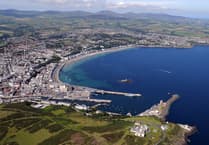The Isle of Man’s economy is set to grow more quickly in the next two years than it had done in the last decade, according to a new independent report.
The latest Credit Opinion Update from international ratings agency Moody’s forecasts that the Isle of Man’s Gross Domestic Product (GDP) will grow by 3% in 2025 and a further 3% in 2026.
The Island’s real GDP growth has averaged an estimated 1.9% between 2013 and 2023. In 2020, the coronavirus pandemic pushed the economy into a rare financial downturn, although a robust recovery was recorded in 2021. The economy also withstood the energy price and inflation shocks over 2022 and 2023.
Isle of Man Government Treasury Minister Dr Alex Allinson said: ‘Our Island Plan and the Economic Strategy as approved by Tynwald are delivering real opportunities for individuals and businesses across our Island.
‘2025 will see the launch of a Local Economy Strategy which will support and incentivise those small local businesses which form the foundation of our high streets.
‘Significant private investment will also become more apparent through the Infrastructure Investment Scheme and the Chief Minister will be starting the year announcing a major initiative to increase Government efficiency and productivity.’
Moody's Corporation is a prominent global and independent financial services company known primarily for its credit rating agency, Moody's Investors Service.
It is considered to be one of the ‘big three’ credit rating agencies in financial circles, along with Standard & Poor's (S&P) and Fitch Ratings.
Credit rating
The Moody’s report also predicts that the Isle of Man’s credit rating and outlook will remain at Aa3 stable - the same as the UK.
Moody’s notes the Island’s credit strength, diverse economy and substantial reserves in the Credit Opinion Update report.
Pragmatic policymaking is also highlighted as a particular strength of the Isle of Man, along with a prudent and forward-thinking fiscal approach.
However, the report does highlight potential risks over the volatility of the small economic base, global pressures to revise the island’s tax system and uncertainty over the impact of Brexit.
But the report remarks on the Island’s robust recovery since 2021 and highlights the Economic Strategy’s plan to leverage investment of £1 billion domestically over 10-15 years.
Dr Alex Allinson said: ‘The Treasury’s efforts to reduce a reliance on reserves in recent years is acknowledged and this remains a key priority as we approach February’s Budget announcements.
‘The island isn’t alone in facing sustained financial challenges, particularly around the rising cost of health and social care.
‘We are, however, able to continue working from a firm economic base — as the report makes clear — with the forecast of positive economic growth and a resilient and diverse economy.’


-HiRes-print-37-(003).jpeg?width=209&height=140&crop=209:145,smart&quality=75)

.jpeg?width=209&height=140&crop=209:145,smart&quality=75)